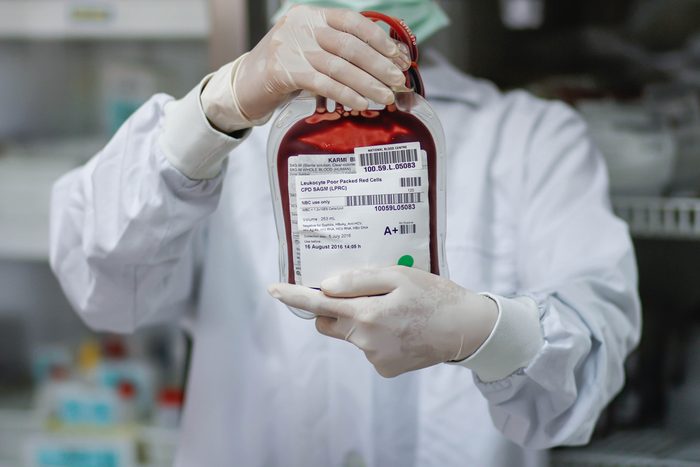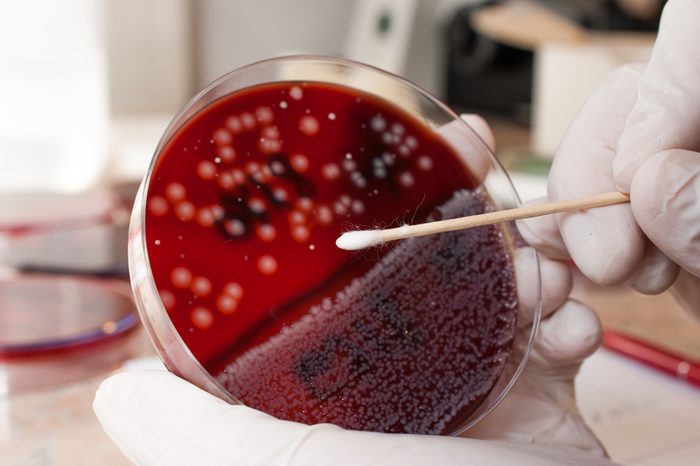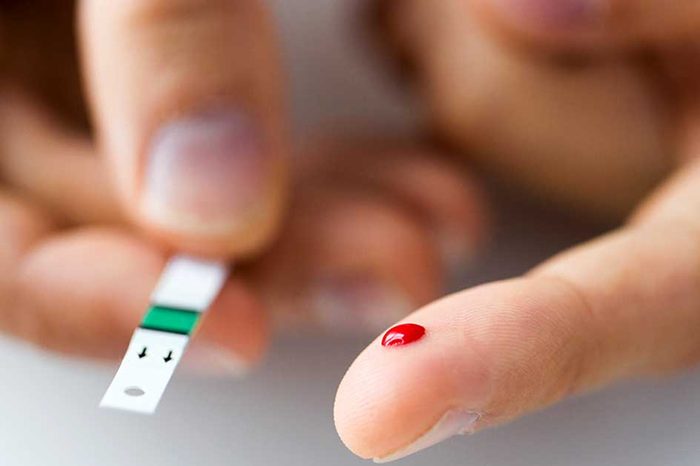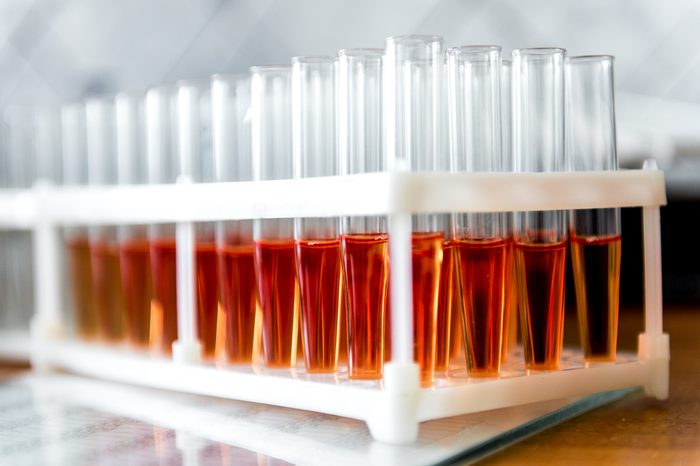Your blood type matters
Unless you’ve recently given blood, you may not think much about your blood type. The presence or absence of certain molecules called A or B antigens, as well as a protein called the Rh factor, determine which of the eight common blood types you have coursing through your veins. (The American Red Cross notes that these blood types are: A+, A-, B+, B-, AB+, AB-, O+, or O-.) However, these antigens make a difference beyond just your blood, according to an article published in Blood Transfusion in 2013. They can influence other parts of your body, including blood vessels, neurons, and platelets, and as a result, your blood type may be linked to your risk of developing certain diseases.
How to Find Out Your Blood Type at Home, the Doctor’s Office, and More
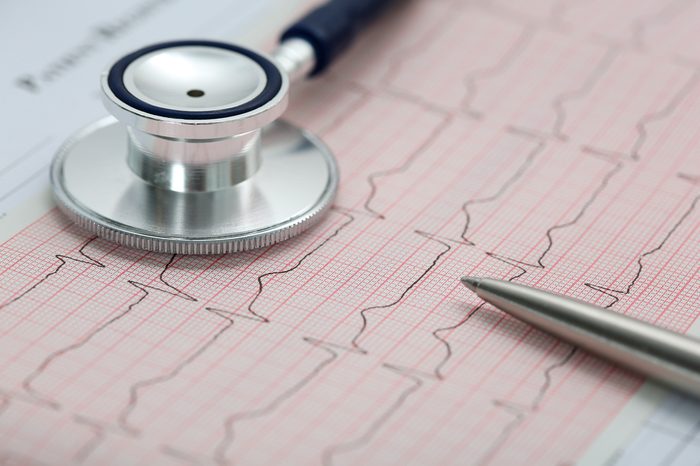
Types A, B, AB: Heart disease
Non-O blood types have 25 to 30% higher levels of blood-clotting proteins known as von Willebrand factor and factor VIII. In part, because of that difference, these folks also have a 15% greater risk of dying from heart disease compared to people with other blood types, according to 2015 research from BMC Medicine.
This Nightly Habit Could Reduce Your Risk of Heart Disease, Says New Study
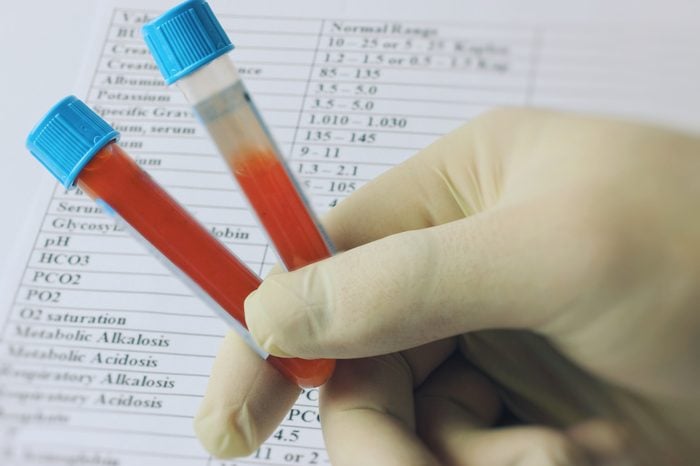
Type O: Lower risk of blood clots
Considering that type Os have lower quantities of the proteins that help blood coagulate, they’re also less likely to suffer from blood clots. (The downside is that blood clotting helps prevent excessive bleeding.) That said, there are many things that cause blood clots. “It shouldn’t be assumed that being an O blood type means an individual is ‘protected’ or an A blood type is at higher risk,” says Terry B. Gernsheimer, MD, a hematologist and the director of the UW Medical Transfusion Service at Seattle Cancer Care Alliance in Washington.

Type O: Fertility problems
Type O may be the most common blood type—and it may interfere with pregnancy. As research published in the journal Human Reproduction notes, O types were twice as likely to have levels of follicle-stimulating hormone (FSH); the levels were high enough to indicate low ovarian reserve—fewer egg cells for fertilization. Another study published in the Journal of Assisted Reproduction and Genetics found that women with both O and A blood types were less likely to experience successful IVF (i.e., resulting in a live birth) than those with type B, whose odds were higher.
These Are the 6 Best Foods for People Trying to Get Pregnant, Say Experts
Non-O type: An increased risk of gastric cancer
Another interesting finding from the BMC Medicine study that linked certain blood types to a higher risk of heart disease: Non-O blood types (A, B, or AB) also had an increased risk of gastric cancers, possibly due to an inflammatory response to H. pylori bacteria. (The bacteria are a cause of gastric ulcers.)

Non-O types: Deep vein thrombosis
Because of differences in clotting, A/B blood types are more likely to suffer from venous thromboembolism—a clot that forms in the deep veins of the leg, groin or arm (deep vein thrombosis, or DVT), and can break off travel to the lungs (pulmonary embolism)—compared to O types, according to research published in the journal Blood Transfusion. The study additionally found that non-O types with inherited thrombophilia, a condition in which blood coagulates abnormally, raised their risk threefold.
5 Traits You Didn’t Know You Inherit from Mom (and 4 You Inherit from Dad)
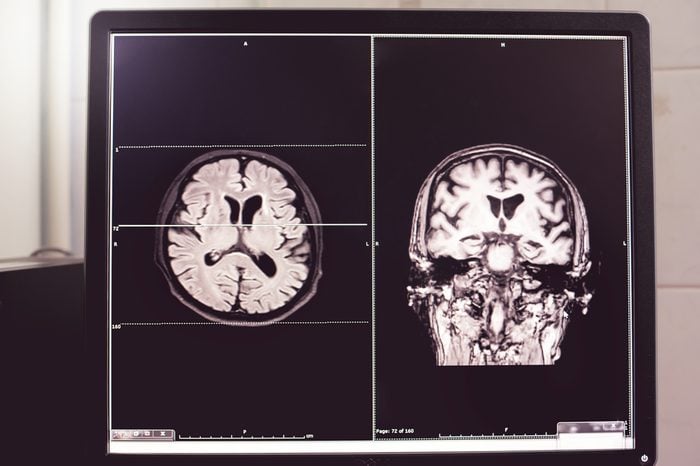
Type AB: Memory loss
Though AB is the least common blood type, research published in the journal Neurology in 2014 suggests that people with AB are 82 percent more likely that people with other blood types to develop cognitive issues that could lead to dementia later in life. The study’s authors theorize that this may be because AB blood has higher levels of factor VIII.
Over 40? Here Are 9 Clever Memory Exercises to Start Doing Today
Type A or B: Diabetes
People with a blood type of A or B have an up to 21 percent greater risk of developing type 2 diabetes compared to those with type O, according to a study published in the journal Diabetologia. (Those who were B positive had the highest odds.) While researchers note that it’s not exactly known why, one thought is that the blood type may influence the GI microbiome, which can affect glucose metabolism and inflammation.
Doing This Daily Can Reduce Your Diabetes Risk by 74%, Says New Study
It can’t tell you about your perfect diet
You may have heard people talk about the blood-type diet, in which eating and avoiding certain foods based on your blood type can boost your health and lower your risk of disease. However, a 2013 review in the American Journal of Clinical Nutrition concluded that there’s no evidence that proves these types of diets actually work. Another study published in PLOS ONE found that while following a diet like this may have a positive effect on some cardiometabolic risk factors, it has nothing to do with someone’s specific blood type.

It probably won’t tell you anything about your personality
There’s a theory that your blood type can explain why you act the way you do. While that largely hasn’t been proven, one Japanese study published in PLOS ONE found that some personality traits differed between blood groups. People with type A, for instance, scored higher on persistence compared to types B or O. However, even the researchers note that there aren’t enough data to prove the connection. Until we know more, it looks like you can’t use your blood type as a scapegoat for your behavior.
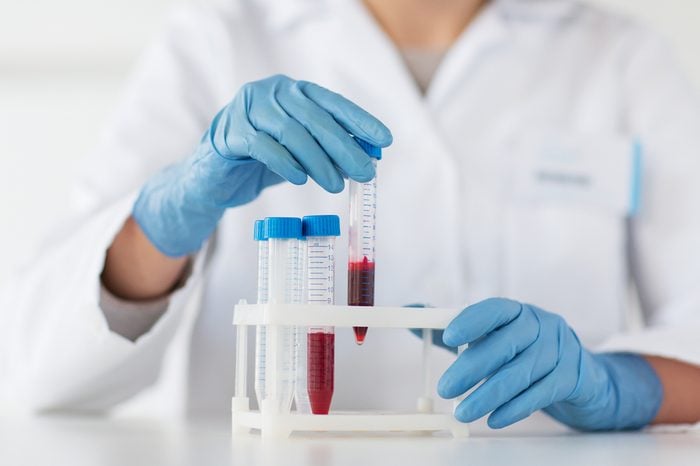
What to know about blood-type research
Keep in mind that the research linking blood type and health conditions looks at population studies, so it can only find an association between these two things, not definitively prove that your blood type is the cause of a specific condition. “The risk for any one person is multifactorial,” notes Dr. Gernsheimer. That means your daily habits—what you eat, your activity level, how you handle stress, and your family history—make a huge difference in your individual risk.
You don’t have to overhaul your life because of your blood type
Your blood type certainly doesn’t seal your fate when it comes to your health. “It’s important to understand that blood groups also vary in different ethnicities and within ethnic groups depending on where they settled during migrations,” says Dr. Gernsheimer. “These differences in cultures may lead to differences in diet and lifestyle that further affect risk.” Plus, even though there are many ways your blood type may influence your health, Dr. Gernsheimer says that “there isn’t good evidence that one’s lifestyle should be altered because of it.” Next, check out these obscure facts you never knew about your own body.
Get The Healthy @Reader’s Digest newsletter for what’s trending in health and wellness daily. Follow us on Facebook, Instagram, and Twitter, and keep reading:


